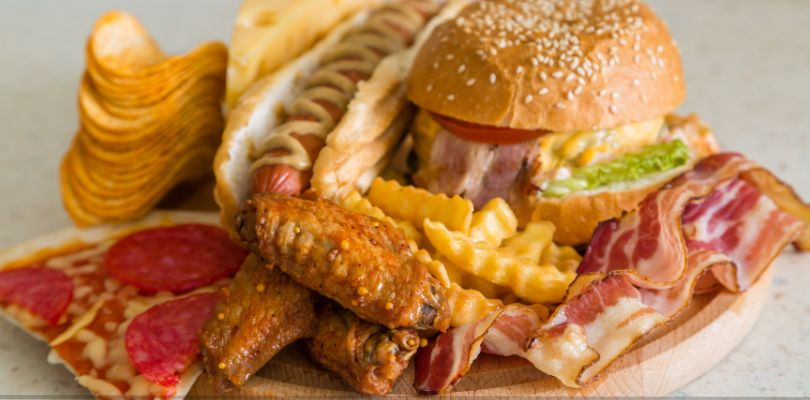Unhealthy Foods, Signs and Treatments
Diet plays a significant role in overall health, and certain foods can affect the risk of developing or worsening breast cancer. To help with breast cancer, consider Talzenna (talazoparib), a medication used in the treatment of certain types of breast cancer. It works by blocking an enzyme called poly ADP-ribose polymerase (PARP).
Worst Foods for Breast Cancer
Processed Meats
Processed meats, such as bacon, sausage and deli meats, contain preservatives and additives that can be harmful. They often have high levels of sodium and nitrates, which have been linked to an increased risk of cancer, including breast cancer.
Limit intake of processed meats and opt for lean, unprocessed meats or plant-based proteins instead.
Did you know there are different drinks to avoid with eosinophilic esophagitis? Keep reading to learn more.
High-Fat Dairy Products
Some studies suggest that high-fat dairy products, like whole milk, cheese and butter, may contribute to higher estrogen levels, which can promote the growth of hormone-receptor-positive breast cancers.
Choose low-fat or non-dairy alternatives to reduce intake of saturated fats.
Sugary Foods and Beverages
Excessive sugar consumption can lead to obesity, a known risk factor for breast cancer. High sugar intake can also increase insulin levels, potentially promoting cancer cell growth.
Reduce consumption of sugary snacks, desserts and beverages. Opt for natural sweeteners and fruits for a healthier diet.
Red Meat
High consumption of red meat, especially when cooked at high temperatures, can produce carcinogenic compounds that increase cancer risk. Studies have linked red meat to an elevated risk of breast cancer.
Limit red meat intake and choose healthier protein sources like fish, poultry and plant-based options.
Fried Foods
Fried foods are often high in unhealthy fats and calories, contributing to obesity and inflammation. Both factors are linked to an increased risk of breast cancer.
Avoid fried foods and choose baking, grilling or steaming as healthier cooking methods.
Highly Processed Foods
Highly processed foods often contain unhealthy fats, sugars and preservatives. These foods contribute to obesity and may have other harmful effects that increase cancer risk.
Choose whole, minimally processed foods for a healthier diet.
Refined Carbohydrates
Foods like white bread, white rice and pastries have high glycemic indices, leading to spikes in blood sugar and insulin levels. This can contribute to an environment that supports cancer growth.
Opt for whole grains and complex carbohydrates to maintain stable blood sugar levels.
Signs of Breast Cancer
Early detection of breast cancer is crucial for effective treatment. Be aware of the following signs:
- Lump in the breast or underarm: The most common sign is a new lump or mass, which is often hard and painless.
- Change in breast shape or size: Unexplained changes in size or shape of the breast can be a warning sign.
- Skin changes: Dimpling, puckering, redness or thickening of the breast skin should be examined.
- Nipple changes: Look for nipple discharge (other than breast milk), inversion or pain in the nipple area.
- Persistent pain: While not typically associated with breast cancer, persistent pain in the breast or armpit should be checked.
Breast Cancer Treatments
Treatment for breast cancer varies depending on the stage and type of cancer, as well as the patient’s overall health. Common treatments include:
- Radiation therapy: Uses high-energy waves to target and kill cancer cells, often used after surgery to eliminate remaining cells.
- Chemotherapy: Involves the use of drugs to destroy cancer cells, which can be administered orally or intravenously.
- Hormone therapy: Effective for hormone-receptor-positive breast cancers, it blocks the body’s natural hormones that fuel cancer growth.
- Targeted therapy: Uses drugs or other substances to precisely identify and attack cancer cells without harming normal cells.
- Immunotherapy: Helps the immune system fight cancer, typically used for advanced breast cancer.
- Talzenna: Talzenna (talazoparib) is a prescription medication used in the treatment of certain types of breast cancer. It belongs to a class of drugs known as PARP inhibitors, which work by interfering with the DNA repair mechanisms in cancer cells, thereby preventing them from growing and dividing.
Breast Cancer and Diet
A healthy diet is a crucial aspect of reducing breast cancer risk and supporting overall health. Limiting intake of processed meats, high-fat dairy, sugary foods and beverages, red meat, fried foods, alcohol, highly processed foods and refined carbohydrates can be beneficial. Early detection through awareness of breast cancer signs and pursuing appropriate treatments if diagnosed are essential steps in managing breast cancer. By adopting a healthy lifestyle and staying informed, you can make proactive choices to support your well-being.
Read on to learn about the worst drinks for breast cancer.







